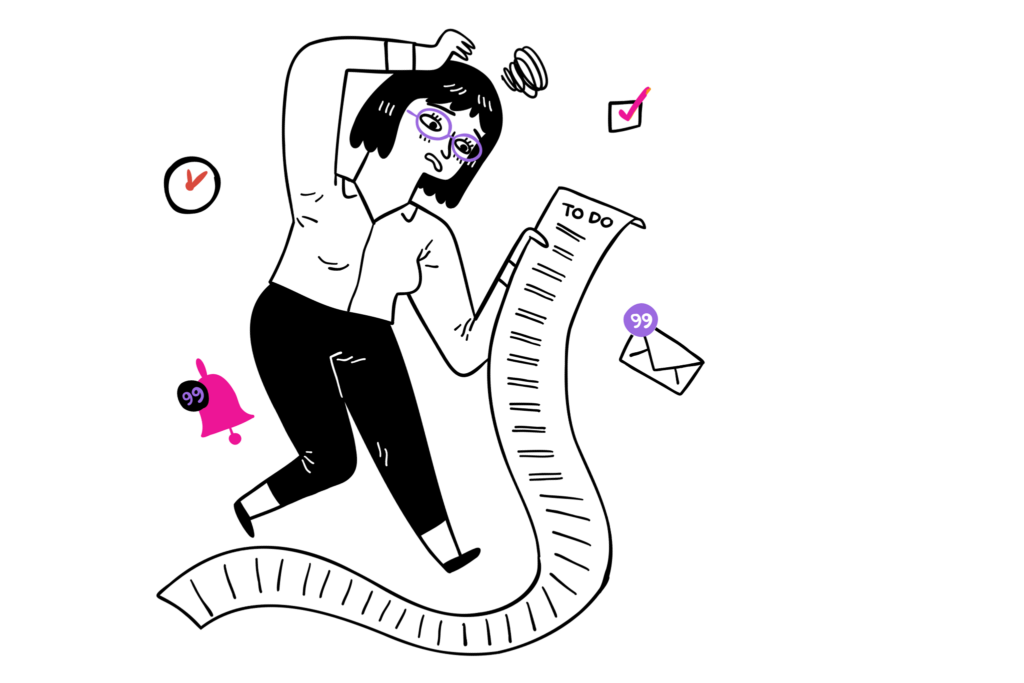
Feeling a bit distracted lately?
Me too. Let me count the ways. I lose things. All the time. Important things. I can’t read more than a few pages of a book without taking a break. If I don’t put Post-it Notes on my phone screen, on the door, and anywhere else I might see them — things will not get done. Without my physical calendar and my super minimalistic productivity system, my world would crumble into ruin.
But is it ADHD? Or is it just a normal state of existence in our frenetic, notification-filled world where your attention is the commodity everyone wants?
Understanding Adult ADHD
Attention Deficit Hyperactivity Disorder (ADHD) is about more than distraction. ADHD is a neurodevelopmental disorder that can affect your attention, impulsivity, and activity levels. It can also cause you to hyperfocus.
Approximately 4% of American adults have severe enough symptoms to qualify for an ADHD diagnosis, but only 10% of the people in this group ever seeks out an official diagnosis. ADHD symptoms in adults are often described as “inattentive” — forgetfulness, trouble focusing, problems getting organized, and procrastination.
Unlike situational distraction, ADHD is persistent and pervasive. It’s not just about having a few scattered days or feeling extra fidgety during a dull meeting. If you have ADHD, it’s more like a constant background track that plays across different areas of your life — home, work, relationships — you name it.
The Core Differences
So how do you know if you’re a quote-unquote normal person struggling to traverse our modern hellscape of daily distractions OR a person with ADHD?
Here are a few things to look for:
- Consistency Across Environments: ADHD tends to show up whether you’re at a loud party or a library. It’s consistent across different settings and situations. If your focus is better in calm, quiet environments, and you only feel distracted in high-stimulus situations, it might just be the environment affecting you.
- Age of Onset: ADHD symptoms typically show up early in life, often before the age of 12. If you’ve always felt like your mind runs on a different operating system, even as a kid, it could point toward ADHD. If these feelings are relatively new, they might be more related to lifestyle or specific circumstances.
- Impact on Daily Life: Everyone loses their keys or forgets an appointment now and then. But with ADHD, it’s more intense and frequent, often interfering with your daily functioning and causing real distress or problems in various aspects of your life.
- Emotional Regulation: ADHD isn’t just about attention — if you have ADHD, you might also struggle with regulating emotions. If you find your emotions are intense and hard to manage, along with attention issues, it could be ADHD.
- Hyperfocus vs Just Being Really Into Something: Here’s an interesting twist — people with ADHD can experience hyperfocus, a state where they’re so engrossed in something that the world could be falling apart, and they might not notice. But this isn’t your average “I love doing this” kind of focus — it’s more like an all-consuming obsession.
Ask an Expert
If you’re nodding along and thinking, “This sounds like me,” the ideal next step is to talk to a professional. A psychologist, psychiatrist, or other mental health professional can assess your symptoms in the context of your life history and other factors to determine whether you have ADHD.
I know it’s tempting to self-diagnose using online checklists and TikTok. But a professional evaluation is key to getting the right diagnosis and the right support, ranging from stimulant medications to behavioral coaching and therapy.
Living in a Distracting World: Tips for Everyone
Whether you have an official ADHD diagnosis or are just feeling distracted, here are a few universal tips to help improve your focus and manage distractions:
- Digital Detox: Allocate specific times to check emails, social media, or news. Constant notifications can fragment your attention, making it harder to focus.
- Mindfulness Practices: Techniques like meditation can enhance your ability to focus and remain present, reducing the impact of external distractions.
- Daily Planning: An online planner can be a life-changing tool. I created the Quiet productivity planner especially for people like me who struggle with distraction and are easily overwhelmed.
- Structured Breaks: Whether it’s the Pomodoro Technique or just taking regular, mindful breaks, giving your brain a rest can boost productivity and focus.
- Environment Tweaks: Tailor your environment to reduce distractions. This might mean a quieter room, using noise-canceling headphones, or having a clutter-free workspace.
- Healthy Habits: Never underestimate the power of good sleep, exercise, and nutrition on your brain’s ability to focus and manage distractions.
Want more quiet? Check out my other blog posts, subscribe to the newsletter, or purchase the exact online productivity planner I use every day. Thanks for reading! Love Anna